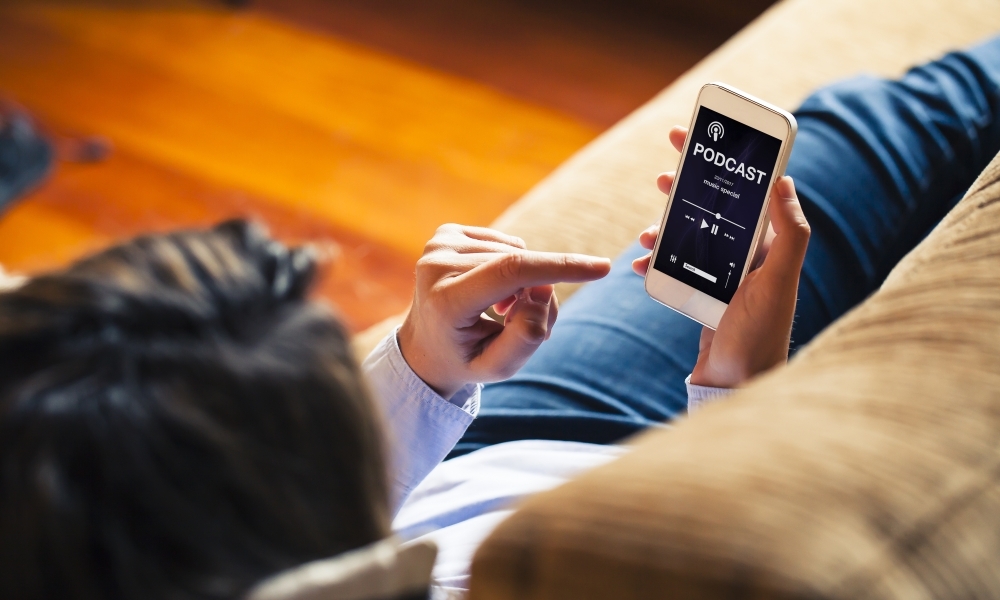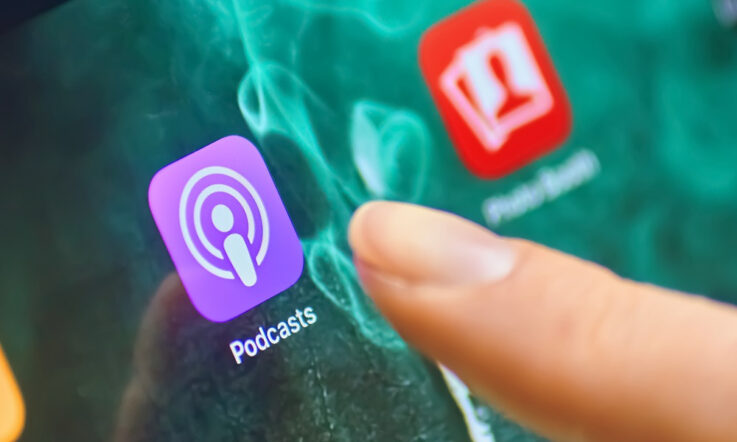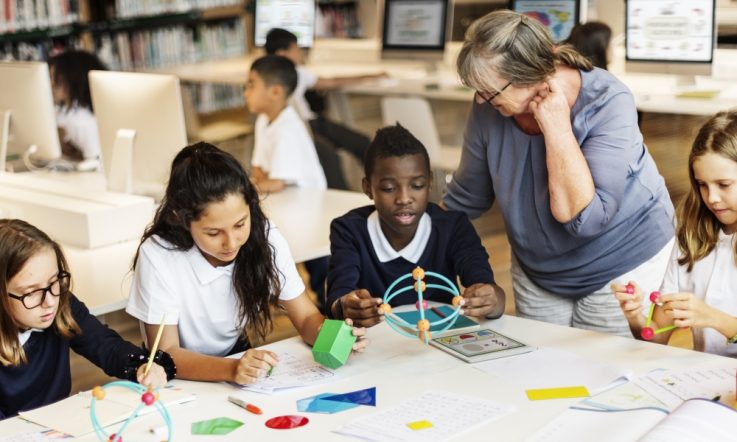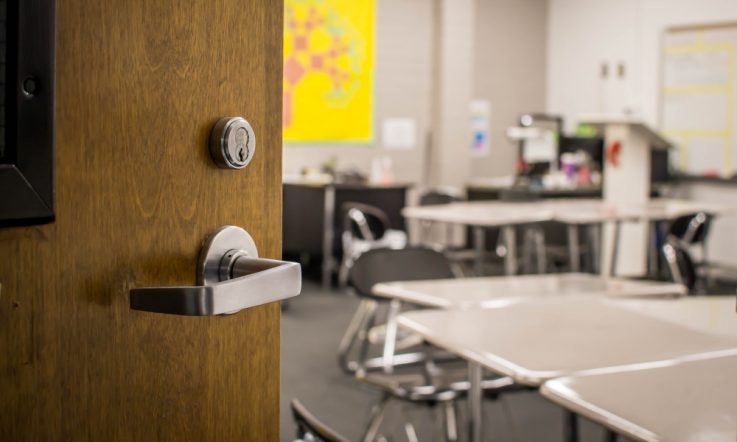Jo Earp: Hello, from Teacher magazine I’m Jo Earp and welcome to this special episode looking back on our podcast highlights from 2020.
Rebecca Vukovic: I'm Rebecca Vukovic.
Dominique Russell: And I'm Dominique Russell.
JE: Well, we’re at the end of another year and what a year it’s been for everyone. It’s been a massive effort from teachers, school leaders, parents and students – everyone really pulling together to keep going through the pandemic lockdown and then the return to a different school life than before. From the Teacher podcast team then, we started the year at our recording studio in Melbourne and we’re ending it still working remotely from home. We’ve spoken to some amazing educators during 2020, and we’ve spoken to experts around the world to bring you the latest in education research. So, today we’re going to take a look back at some of our personal highlights. Let’s get started.
JE: Okay, for my first pick this year we’re going to go back to February. It’s a Research Files episode on trauma informed practice in schools. I interviewed Dr Emily Berger, she’s an educational and developmental psychologist at Monash University in Melbourne. On the day we recorded the episode Australia, if you remember, was battling those huge bushfires. And part of the conversation about helping kids, and yourself, through difficult times, it really stuck in my mind as we continued through the year.
So, in this episode we covered lots of information about terminology, the benefits of trauma informed practice for all students, and some of the different approaches that schools can take as well, so there’s lots of great information in there. We talked about the principles of trauma informed care, and one of those things is consistency, and the fact that different children will have different triggers to provoke the ‘fight or flight’ response. So, in this audio snippet Emily is talking about some of the common triggers.
I've seen a range of things both through my research but also through working as a psychologist. It can be things such as a teacher raising their voice. It could be things such as a door being closed to the classroom, so students feeling that they don't have control over the situation – they can't escape. As you say, fight or flight is all about ‘I'm either going to stay here and fight or I'm going to flee, and is there something in my way that's stopping me from fleeing the situation?' So, teachers raising their voice, or a door being closed to the classroom.
It can be changes in routine – that's probably a really big one, and that's a part of the principles of course that we'll talk about – having consistency in the approach. Not only consistency across home and school, but also consistency in terms of how the teachers actually respond to students. Doing as you say you're going to do for these students. So, not changing the rules half way through for students, that's all about this approach of consistency and collaboration.
JE: That was Dr Emily Berger, our guest on Research Files Episode 57 about trauma informed practice.
RV: This was such an interesting episode to listen to. And it’s interesting, too, that you recorded this podcast back in February, before the pandemic really hit here in Australia, but there’s so much from this podcast that teachers could take and potentially use with their students in response to the pandemic as well.
DR: Yeah, I completely agree. When you said, Jo, that this was an episode that stuck in your mind all year, it definitely has for me too. I think it’s such an important topic that’s obviously got such an ongoing relevance, and I think it’s a really great one to have, a really valuable episode to have in our archives for teachers to access whenever they need.
JE: We mentioned there about sticking [it] in our minds as we went through the year, and when the first wave of the pandemic hit here in Australia there was a really rapid change to teaching and learning from home. My second podcast highlight for 2020 is an episode on how schools adapted to emergency remote teaching. My guest was one of our colleagues here at ACER, Professor Pauline Taylor-Guy – she’s Director of the ACER Institute and the Centre for School and System Improvement.
We spoke about how teachers and leaders adapted their practice to ensure continuity of teaching and learning, some of the early research that they’d done on the impact of school closures and also the fact that actually schools were starting to think more about the kind of ‘normality’ that they wanted to return to – so, you know, the new things that they wanted to keep and the old things they wanted to ditch. And, that’s what Professor Pauline Taylor-Guy is talking about in this snippet.
For example, the possibility of schools networking with each other to offer particular subjects for example, and understanding that a school day doesn't necessarily have to be from 9am-3pm, that you could have some flexibility in the school day. So these are all things that teachers and we know schools are kind of considering.
There was a lovely example from one of the systems we're working with where they're saying: ‘Well, we've turned off all of these things. Which things are we going to turn on now and why?' That's part of system reflection as well as school reflection – things that have worked really well. I certainly think that some of the collaboration that's happened within schools and across schools has been really beneficial, and people are already thinking about ways in which they could use the learning that they've had in recent, turbulent weeks to be able to plan for their students better, and have better infrastructure, maybe, and better skills in their teachers to be able to offer a curriculum more flexibly.
What we've seen with different schools is adapting as they go with their strategies. So, going from taking a roll every day, having students sitting in front of a computer for most of the day (which is really not great practice, not sustainable and very exhausting for students and for teachers) to thinking about: ‘What is it that we really need to concentrate on?'; ‘How are we going to chunk up learning so that there are opportunities, particularly for older students, to be able to do independent learning?'; to have timetables where they can go and do physical activities, and various different activities. So, we've seen schools adapt as they go and really try and focus on the important things. Having catch-up sessions, for example, rather than timetabled classes – so, a kind of Q&A idea.
JE: That was Professor Pauline Taylor-Guy from our episode on how schools adapted to emergency remote teaching, and it’ll be interesting to see what happens as things return to some kind of normality – I’m going to give a quick plug to another episode, my chat with OECD Director of Education and Skills, and long-time Teacher columnist, Andreas Schleicher LINK TO NEW EPISODE. He’s got some really interesting thoughts on what that new normality might look like. Well worth a listen!
RV: Definitely worth a listen, and I’m sure that episode with Pauline Taylor-Guy proved really helpful for many teachers navigating remote learning for the first time this year. On to my podcast highlights now. The first podcast I’d like to share was one we published right at the beginning of the year in January. It stands out to me because it was actually the last time I was able to record a podcast interview face-to-face, before the pandemic hit.
John Munro and I sat down at the radio studio in Melbourne to record a Research Files episode on gifted education. We spoke about how to identify gifted learners, how to understand their learning needs and how to encourage them to reach their potential in the classroom and beyond. John has such a wealth of experience – he’s a Professor of Educational Psychology and Exceptional Learning at The Australian Catholic University. But he’s also a trained primary and secondary teacher and a registered psychologist, so he offers some really interesting insights and practical strategies for teachers in this episode.
I’ll play a short snippet from the interview for listeners now. It’s John discussing the way that teachers should give feedback to gifted learners that avoids peer comparison.
As teachers, all the time, the feedback we give should, it should recognise what it is that the person knows. It should have some positive emotion in it so the students link positive emotion with the ideas, but also there should be a bit of direction – ‘but what about?', ‘where might it go next?', or ‘why do you think that?' So in terms of giving feedback to the gifted students, we need to bear in mind what we're giving feedback for. In a regular classroom, I will give feedback when a child has taken the information and given it back to me, when they've shown they've learned it. With a gifted child, I also need to give feedback … by looking for what they know now. Not how well has the teaching worked, because these students have actually gone a whole lot further than the teaching. And so I need to have them know that they'll get feedback for telling me all that they know or believe about ... what is their theory about it? What are the possibilities that they see? And I need to be prepared to give feedback for that. I will give feedback for that to any student, but I know the gifted students will be able to do that much better.
JE: Yeah, I really enjoyed that episode, and John Munro, as you say, what a legend he is. So I was really envious that you got to interview him. What I really love about this particular snippet is that idea ‘what’s the purpose of feedback?’ Because often, we kind of miss that, and think: ‘yes, I need to give feedback’ but actually sitting down and having a clear think about what it’s for and how it’s going to benefit the student, and you’re understanding of their learning too. So, yeah, that’s a big highlight for me as well this year.
DR: Yeah, I was so glad you picked this episode, I got so much out of it, it was just filled with such amazing insight. And as you say, even just from that clip there, there are so many things you could pick out and apply to your own teaching. I liked as well, further on in the episode, you also touched on the social and emotional needs of gifted learners, because that’s obviously such an important consideration to make as well.
RV: Yeah, I was really looking for something that teachers could find some practical strategies in, so this podcast is full of them. Another podcast that I’d like to share from this year was my chat with Lisa Seewraj, a teacher at Child Side Playgroup and School in Boyanup, Western Australia, about 200 kilometres south of Perth. I always love the opportunity to sit down with teachers to talk about their practice or their school and issues affecting their local communities.
Lisa’s school is quite unique – it’s an independent, co-educational school covering Kindergarten to Year 10. The school was founded in 2002, with a focus on relationships, engagement and connectivity. … Lisa teaches a multi-age class of 23 students across Years 7-10. I really wanted to hear more about how she manages the classroom on a daily basis, the range of abilities that she caters for in her classroom, and how she provides each student with the appropriate level of challenge to progress in their learning.
Here’s Lisa discussing how she assesses students when they are at such different levels.
There are many, many different ways to do this and we don't look to just one outcome. So for example, we will look at various forms of assessment along a child's journey. You've got to remember that our children stay in a cluster potentially for four years – so we get to know the child very well, therefore we can actually look at a child's progression, it's not just about recording our data sets.
The other thing we can do is we use websites that have online learning elements that are aligned to the curriculum such as Mathletics, WordFlyers, ReadTheory – so you can get a comparison grading so that you can see where the children are sitting within the curriculum framework. But again, because we have such in-depth knowledge of the child, we can in-build assessments just throughout the day. We have opportunities, because we're such a small class, to have conversations with children. We have time to sit down and work with them and we see their progression from Year 7 to Year 10, we keep video recordings so we can look back and compare the growth that they've made. So we're looking more at personalised progressions, than … a year level attainment shall we say.
DR: That’s such a good quote to pick up on there, and I agree, it’s always so fascinating to hear about educators working in such unique school contexts and to have the opportunity to share the fantastic work they’re doing to improve learning.
Time to share my highlights from this year. My first is from an episode of The Research Files, published in June. After the release of four papers on science learning in the early years, I caught up with co-author of the report, Gayl O’Connor, a Senior Research Fellow at ACER. We covered so much in this episode, and Gayl offered a bunch of practical tips which I’m sure would have been really thought provoking for our listeners. One point I’d like to highlight here, though, is where Gayl shares an interesting point on how educator confidence plays a part in facilitating science education in the early years. If you’d like to catch up on the rest of this episode, you can search for Episode 59 of The Research Files wherever you get your podcasts. Here’s Gayl:
Many early years educators are already science educators, but don't think about themselves as that. But they're already setting up fantastic tables in the corner, which are the science tables, with really amazing objects for the kids to go and have a look at and a magnifying glass perhaps on hand, or a microscope. But it's really just taking that extra step to actively ask questions of the children as they're using those objects, having a look at them and saying, ‘oh let's compare that one to that one. How's that one different? I wonder where that animal lives'.
So that's one way to start to build confidence. And it's okay not to know all of the answers to questions children might raise. We know they can come up with some really tricky and random questions. It's okay to say ‘wow, that's a great question, let's find out together'. Because that's what scientific inquiry is about, and that's fine.
JE: That was a great one Dom, and lots of really interesting evidence-based info in the series of papers there for early years and early primary educators. And, actually if you go to the transcript of that episode on the Teacher site (a reminder it’s Episode 59 of The Research Files) you’ll find links through to the series of papers and there are also some practical learning activities that go with them. So, if you’re wanting to some actual activities in science and some guidance on those, that information and the free resources are there as well.
Okay, before we move on to the next highlight, a big shout out to our podcast sponsors this year, and to our Founding Partner, Bank First. Their support means we can keep on doing what we are doing here at Teacher. I recently caught up with Bank First acting CEO Matthew Ricker for a quick end-of-year chat.
JE: Hi Matthew, great to speak to you. In this highlights episode, we’ve been looking back on our podcasts from 2020. Of course, it's been such a challenging year - starting with the bushfires and then the pandemic. Bank First is a customer owned bank and I know that customers and supporting the community are really at the heart of what you do.
Matthew Ricker: Yeah, that’s right Jo. We are a values-based customer owned bank. We believe in care and empowering people and believe in those who care about others. We put our customers first and all of our profits are really there to go back to better products and services for our customers, as they’re really our shareholders. So, we’re driven by care and compassion and committed to providing a better banking experience to all the people and occupations that drive a better community for us.
JE: And teachers, leaders, educators and support staff working in schools, have really gone above and beyond in 2020. Bank First was founded in 1972 for teachers. A major part of your communications this year - including through Teacher magazine of course - has been about thanking educators, hasn't it.
MR: Yeah, that’s right Jo. This year has thrown up some incredible challenges for everybody in terms of adapting and certainly our educators have been right at the frontline of that and we can only imagine the agility that they’ve needed. So, we developed our Thank You campaign and, as a bank that started off and exists to serve the education community, we were just so proud to offer our support and thanks during this difficult period. Sometimes you can’t really do a lot other than say those words, and we just feel that the education community has gone above and beyond during these times – so, offering strength, compassion, dedication, skill and expertise to all of their constituents has been fantastic. Now, more than ever, the Bank First team gives our thanks to our educators.
JE: You're acting CEO, following the retirement of William Wolke. Michelle Bagnall will be taking on the role of permanent CEO in the New Year. We wish Bank First every success for 2021. From everyone in the Teacher team, thanks for your continued support.
MR: Thanks Jo and we thank you for your support. It’s been fantastic and we look forward to working with you and the education community as we head into 2021.
JE: That was Matthew Ricker there from Teacher Founding Partner, Bank First. And you can find out more about their products and services at bankfirst.com.au. Okay, over to you Dom.
DR: Let’s move on to my next podcast highlight now, and the final for this episode. It’s a more recent episode where we put the spotlight on a school in Tasmania. It’s Episode 28 in our School Improvement series, titled Refocusing Teaching and Learning. I spoke with Principal Elizabeth Humphries and Assistant Principal Nicole Wilson from East Derwent Primary School about how they turned around their school from one where behaviour management was the focus of getting through each day, to one where staff were truly committed to each student succeeding.
It was an inspiring story of school improvement which began after the school was invited to participate in a Tasmanian Department of Education initiative. The initiative focused on play and inquiry, and Elizabeth and Nicole explain in the episode how adopting it led to more engaged students, which of course, in turn, led to fewer behaviour management issues. The point I’d like to highlight here is where Elizabeth explains the impact this program has had on their school community:
It's had a huge impact indeed. So our system data shows that across the school our suspensions have decreased by 75 per cent between 2017 and 2020. And we also have the school database where behaviours that need support from senior staff are recorded. In 2018 our senior staff team processed over 2000 of those behaviour issues and halfway through this year we had only 400 which is, you know, on track for an 80 per cent decrease.
So physical aggression is now a rarity, students get back on track quickly because they're engaged, I think, and because they actually really want to be in school and they want to be in classrooms because they're experiencing success. Walking through our classrooms today, you can see students who are happily engaged in hands-on learning, building their own understandings through play and inquiry, making connections across the curriculum, all in a collaborative way. It’s a much calmer, focused school.
JE: Well, that’s it for another year. The podcasts we featured today were just some of those published in 2020 – there’s plenty more from this year, along with our full back catalogue, in the archive. In fact, there are now more than 180 to binge on from our series on Behaviour Management, School Improvement, The Research Files, Teaching Methods, Action Research, Global Education, our monthly Teacher Staffroom catch ups, and the special episodes. You can get them on the Teacher website, or wherever you get your podcasts – hit the subscribe button to make sure you don’t miss out. A reminder that we also publish a full transcript of every episode on our website. As I say, that’s it for this year. From everyone in the Teacher team thanks to you, our listeners, and of course to all our guests and sponsors this year. We’ll be back in early January.



